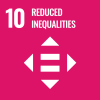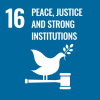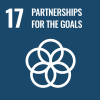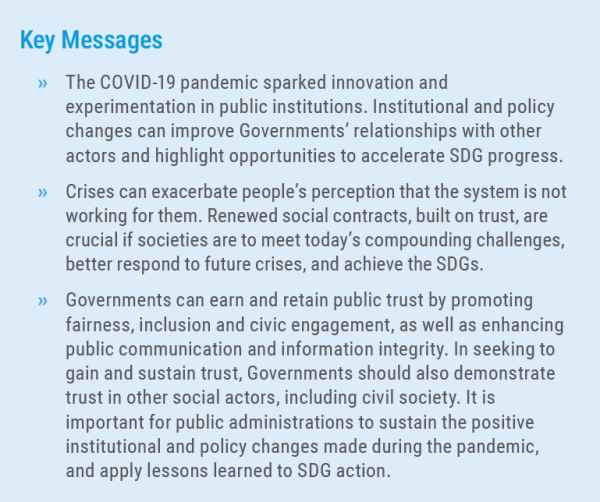
With less than seven years left to the 2030 deadline, progress towards the Sustainable Development Goals (SDGs) has been limited. But, at the SDG Summit in September 2023, Member States of the United Nations committed to bold, ambitious, accelerated, just and transformative actions to achieve the 2030 Agenda for Sustainable Development. For Governments, strengthening relationships and earning public trust is pivotal to realizing the changes required for more sustainable and resilient societies. While the COVID-19 pandemic significantly hindered advancement towards the Goals, and in some cases reversed progress, it also sparked innovation and experimentation in public institutions and in the way they interact with one another and broader society from which lessons can be drawn to reinvigorate efforts.
The pandemic highlighted the salience of Governments’ relationships with individuals, civil society organizations, private sector entities and other actors, which are both affected by crises and shape responses to them. Collaboration and coordination often facilitated key aspects of the response to the crisis, including regarding vaccines and essential goods and services. By many measures, average trust in government in democracies rose after the pandemic began. Yet at the same time, many countries experienced new or intensified social and political divisiveness and missed opportunities to advance sustainable development.
The pandemic strained social contracts. It exacerbated persistent and evolving governance deficits, the rise of misinformation and disinformation, and the shrinking of civic space. Yet successful and promising institutional and policy changes were made by public administrations, such as those relating to the promotion of fairness, inclusion and civic engagement and the enhancement of public communication and information integrity. This policy brief presents lessons and experiences in these areas, drawing from eight contributions to Chapter 1 of the World Public Sector Report 2023: Transforming institutions to achieve the Sustainable Development Goals after the pandemic that were provided by thirteen external experts. It highlights opportunities to build an enabling environment for strengthened social contracts between Governments and their people and improved relationships with greater trust.
FAIRNESS AND INCLUSION
The COVID-19 pandemic amplified calls for fairness in governance, revealing the tensions and weaknesses in social contracts. In many countries, there was a significant shift in public perceptions of governance, including with regard to societal values and the role of the State.
The rapid and vast increase in public spending to address the virus and its effects created large gaps in the resources needed for SDG implementation. In addition, while large numbers of people, non-governmental organizations and small-scale enterprises experienced serious economic and other hardships, many large multinational enterprises (MNEs) and high-net-worth individuals (HNWIs) saw their earnings and wealth grow. This scenario intensified debate over what MNEs and HNWIs, who benefit from goods provided by the State and financed by taxpayers, “owe” society. The taxation of MNEs and HNWIs was increasingly recognized as a fair and viable way to not only generate revenue in a challenging economic environment, but also reduce wealth and income inequalities. At the international level, discussions about reforms of tax rules for MNEs and related issues have gained traction, including at the UN. At the national level, taxation could be made fairer by increasing the resources available to tax administrations to enhance enforcement as well as services to taxpayers. Spain approved reform to improve the fairness and sustainability of its pension system by increasing contributions mainly from the highest earners and their employers. Alongside efforts to improve the effectiveness of taxes on inheritance, gifts, capital gains and consumption, Governments can also consider the introduction of net wealth taxes.
The pandemic also highlighted how justice systems are critical to upholding people’s rights and supporting their well-being, especially those most disadvantaged. Dispute resolution protected jobs and housing and provided emergency benefits and access to essential services. In many places, justice services were among those that experienced a rapid shift online. The use of digital technologies in this sector has the potential to accelerate progress towards “equal access to justice for all” as well as enhance the effectiveness and inclusiveness of judicial institutions. In Morocco, an app is being developed to facilitate the timely payment of child and spousal support to women. Governments can promote a people-centred approach to justice services by organizing their digital transformation efforts around people’s experience of injustice. In particular, data from across institutions about peoples’ legal issues and use of services enables understanding of and better responses to public needs.
notably adopted the General Data Protection Regulation (GDPR) that requires both public and private entities to protect personal data and uphold privacy rights. During the pandemic, many privacy enforcement authorities published general guidance for data controllers and processors on the application of their privacy and data protection laws in the crisis. In Argentina, the Universal Service Fund has supported steps to allow small operators to provide Internet connectivity and telecommunications services to expand their access.
Representation and inclusion within public administration can also enable more responsive and effective service delivery. Yet many gaps remain, most notably affecting women. Just one third of countries are at or near gender parity at decision-making levels in public administration. The shock to institutions from the pandemic created opportunities for new leadership, which were often missed. It also created opportunities for policy change. New government workplace policies that were developed to sustain operations such as remote and hybrid work have been important in retaining women workers and informed the debate about ways to promote gender equality in public administration. Positive changes made during the pandemic should be assessed, consolidated and integrated into future bold gender equality commitments. At the same time, it is important to remember lessons learned before the pandemic and focus efforts on good practices, including in data and transparency, training and mentorship opportunities, and the use of targets and quotas. The Sistema de Alta Dirección Pública (SADP) in Chile illustrates how quality public employment data can be integrated into transparent hiring and promotion practices to promote diversity and inclusion。
CIVIC ENGAGEMENT
The COVID-19 pandemic shone light on the crucial and various contributions of civil society to crisis response and recovery, from conducting on-the-ground needs assessments and filling gaps in emergency services to monitoring public pandemic spending. Civic space around the world had already been on a steady decline, and after the onset of the pandemic, that decline accelerated. Many countries issued emergency declarations and adopted other measures affecting expression, assembly and privacy. While many measures were important to protect public health, some were used to take advantage of the crisis to stifle dissent and limit civic freedoms. Still, the pandemic enhanced interest in civic engagement, and civic life managed to adapt. To protect and expand civic space, Governments can, for instance, limit the duration of emergency measures and require that their extension be subject to legislative approval, and set up procedures to review such measures affecting civic freedoms in consultation with civil society. In Belize, representatives of civil society were included in the Government’s COVID-19 policymaking committee as well as permitted to participate in parliamentary debates on related measures.
When people are prevented from freely exercising their voice and being heard, they often become frustrated and alienated. This is especially the case for youth. Despite their active engagement in pandemic responses, young people often felt that their views were largely ignored in government pandemic measures. Deliberate and focused attention to young people’s interests and voices can make public policy more future-oriented and sustainable. Initiatives that provide opportunities for deliberation, civic learning and co-design of public policy and that are inclusive of disad-vantaged youth are essential to support youth participation at the local level. In the United Kingdom of Great Britain and Northern Ireland, the London Mayor’s Peer Outreach Team, a group of young people who offer policy input and par-ticipate in outreach projects, provided thoughts and ideas for the city’s COVID-19 recovery plan. Those contributed directly to the 2020 London Recovery Programme, resulting in A New Deal for Young People that guaranteed a personal mentor and access to quality local activities for all young Londoners.
PUBLIC COMMUNICATION AND INFORMATION INTEGRITY
People’s trust in government is strongly linked to public institutions’ accessibility to and engagement with the public regarding their operations. To build trust it is essential for institutions to enhance their transparency and be account-able to and communicate with society more effectively. In particular during crises, Governments should support the free flow of information, disseminate accurate information, mandate proactive disclosure, and establish systems for public access to information. Communication strategies and mechanisms are needed to provide and disseminate accessible and trusted information that can guide the public. During the pandemic, some Governments engaged with other actors such as the scientific community, ensured coordinated and consistent messaging in multiple languages, and leveraged multiple channels of delivery and technological innovation to optimize their communication with the public. In Senegal, the Government analysed data to determine pat-terns in how the public accesses different types of media, which enabled public health officials to deliver critical information at the appropriate times to specific populations at the community level. It is important to learn lessons from communicating on past crises to ensure preparedness for future ones.
Increasingly, misinformation and disinformation spread through digital technologies impair the effectiveness of public communication and threaten trust in government. During the pandemic, false information fuelled distrust in public health officials and undermined public health responses. Some countries have taken punitive measures and adopted restrictive laws to address the challenge, though these can infringe upon the right to free expression. Instead, Governments can promote information integrity by ensuring that citizens are guaranteed access to information, independent media institutions can operate freely and with protections, and proactive and innovative approaches are used to disseminate accurate and accessible information. They can focus on improving media literacy skills, espe-cially among children and youth still in school, and enhanc-ing access to accurate information through partnerships with local media and private organizations. In South Africa in 2020, the Western Cape government collaborated with Google Africa on an initiative that included an online safety curriculum for secondary school students and correspond-ing training for teachers.
CROSS-CUTTING CONSIDERATIONS
The pandemic period illustrated the value of fostering creativity and experimentation, on the part of public servants and other actors, and sustaining the positive changes realized. Across these areas, more intentionality in government action, particularly in consideration of peoples’ experiences and needs, can enable more appropriate, effective and people-centred services in the short term, and further serve to enhance efficiency over the long term. Participatory design supports innovation as well as solutions that are better suited to diverse and local contexts, even though it requires managing and can be unwieldy. Digital transformation enables various ways in which Governments can improve their performance and responsiveness, yet it also entails risks that must be assessed and mitigated. Strengthening legal and regulatory systems to hold public institutions account-able for respecting, protecting and fulfilling human rights both online and offline is essential to protect against such risks and gain public trust. The “principles of effective governance for sustainable development” endorsed by the United Nations Economic and Social Council reflect these and related considerations and can serve as a guide for their application and SDG action.
LOOKING AHEAD
When people feel that governmental systems are working for them, the gap between them and government is narrow. Crises can weaken this perception. Renewed social contracts built on trust are crucial if societies are to meet today’s compounding challenges, better respond to future crises, and achieve the SDGs. Governments cannot strengthen their relationships with other actors alone, but they can lay the groundwork by creating an enabling environment for strengthened relationships and strive to earn and retain pub-lic trust. They can take broad steps to renew social contracts by promoting inclusion and civic engagement as well as developing effective communication strategies and mecha-nisms for disseminating accurate information to the public. They can also demonstrate trust in other actors, including those in civil society. The examples provided above highlight some areas of opportunity, with solutions that Governments can consider adapting to suit their specific contexts.
 Welcome to the United Nations
Welcome to the United Nations



